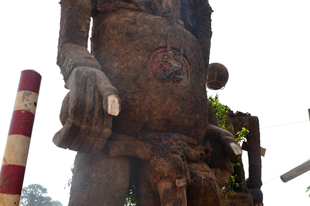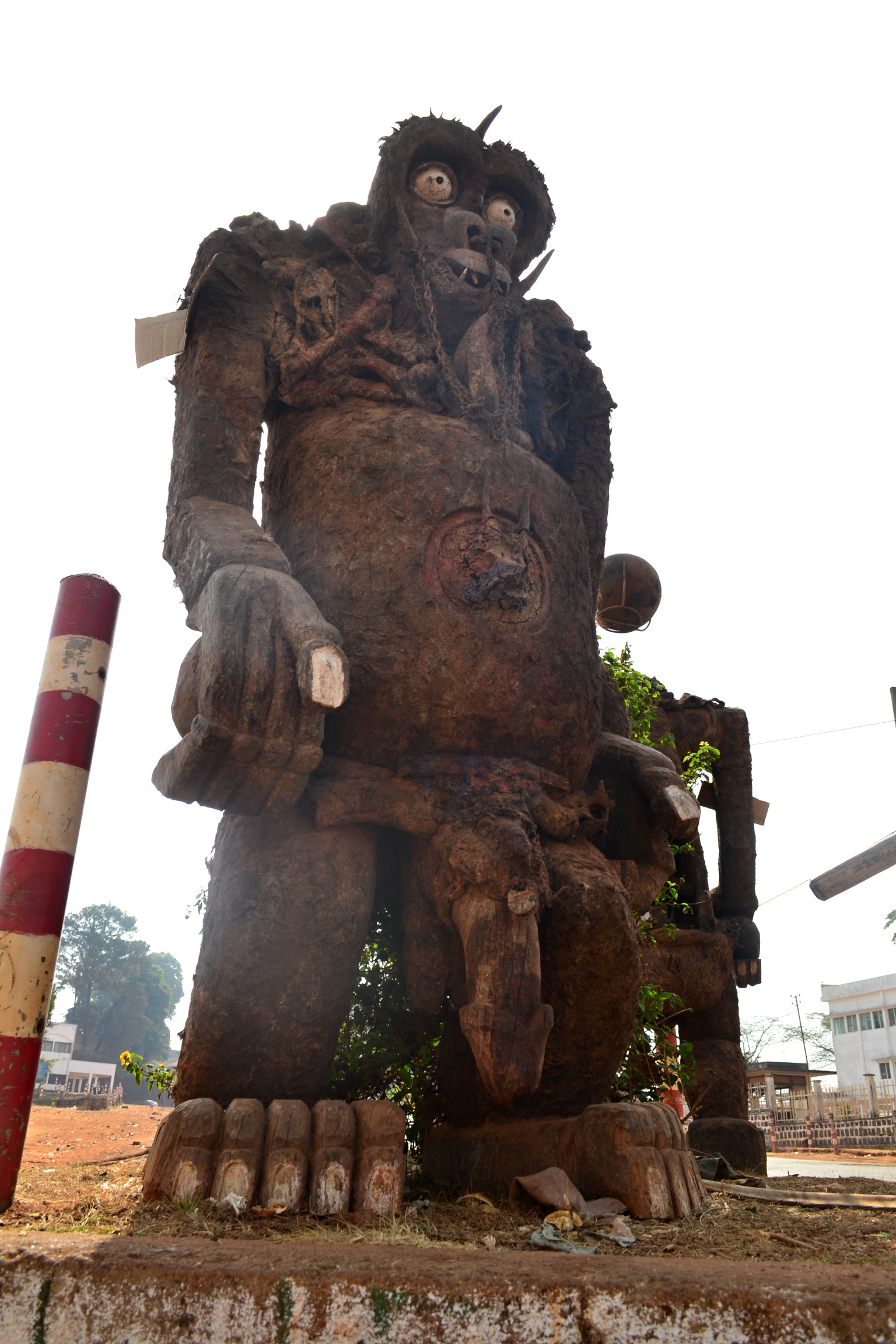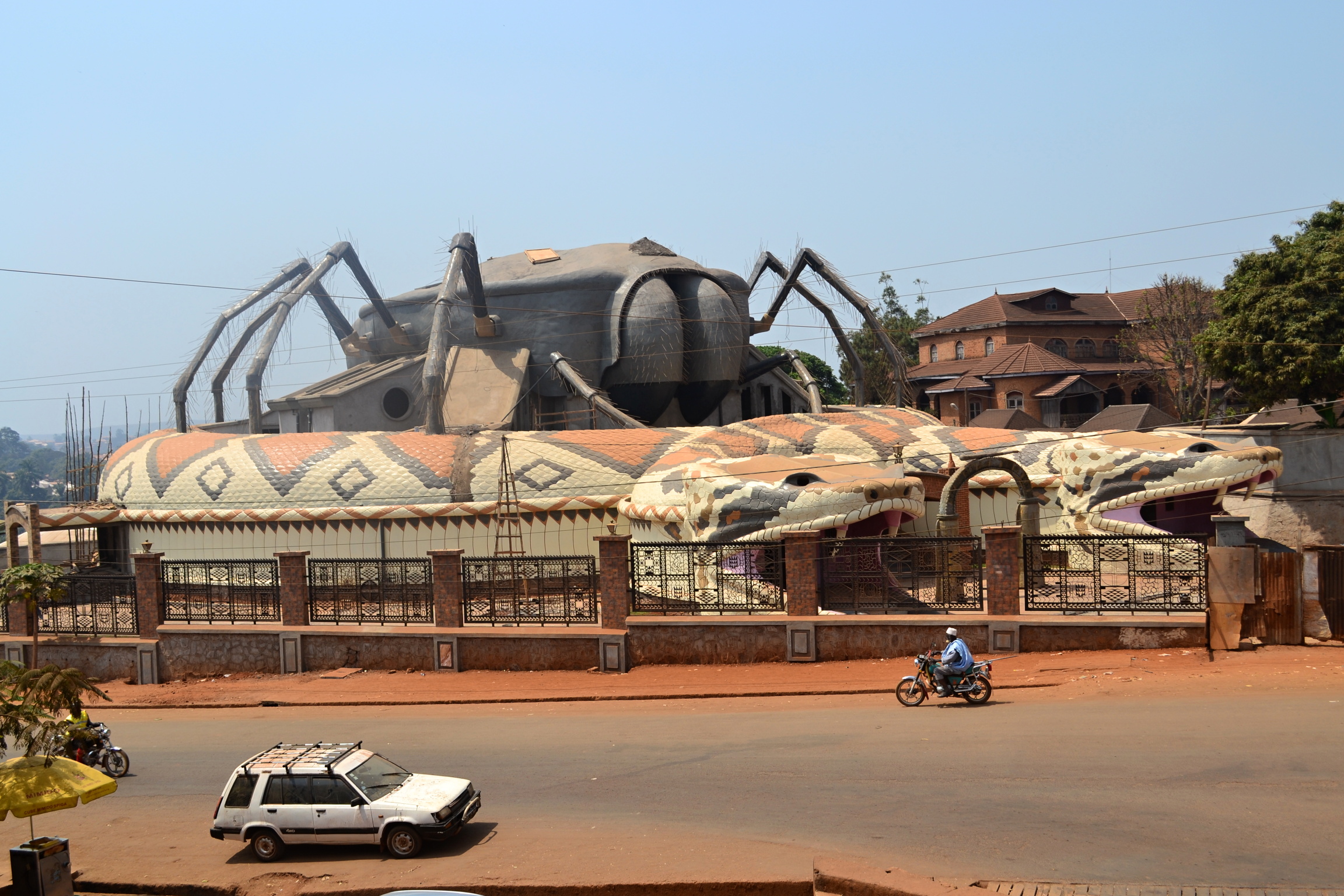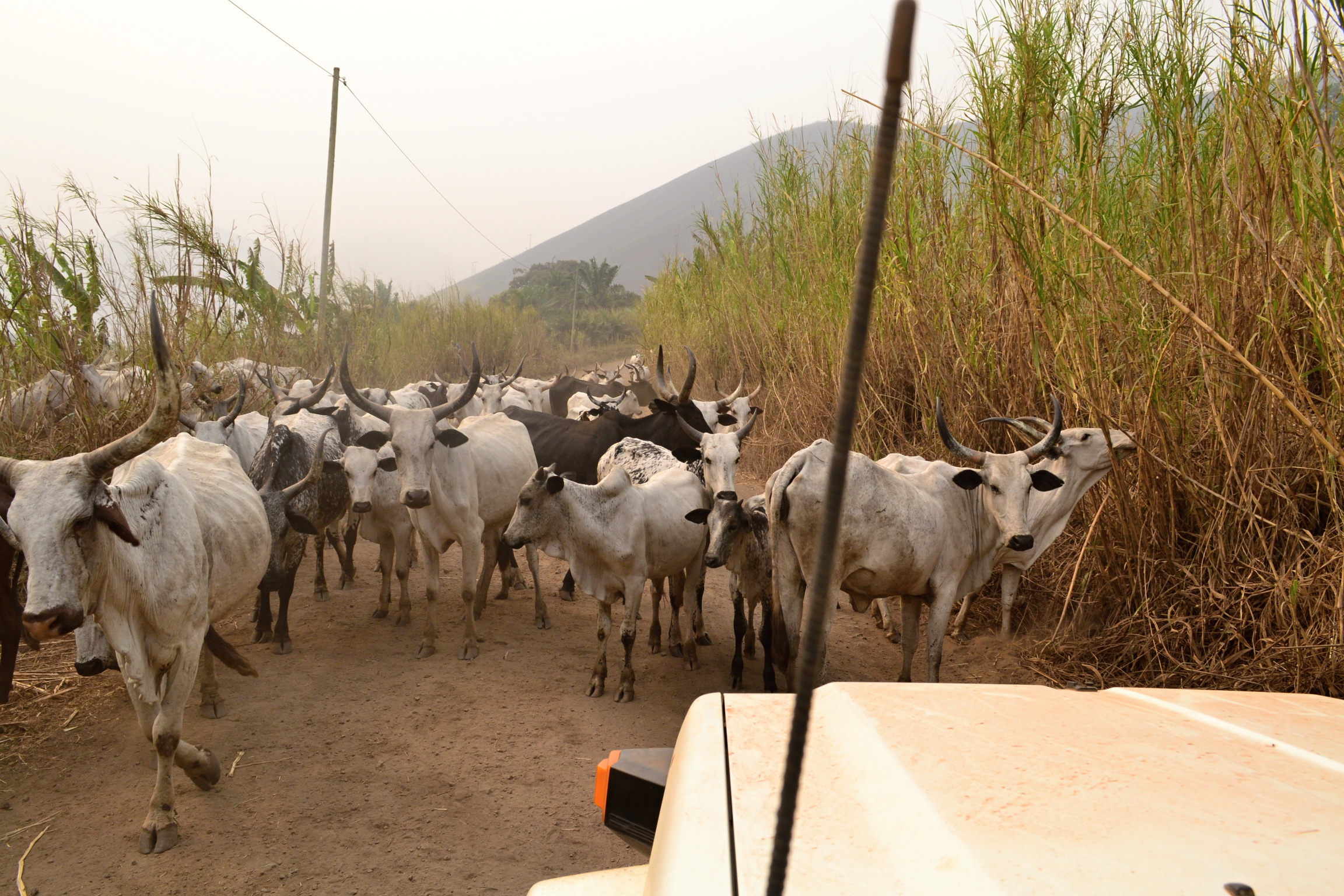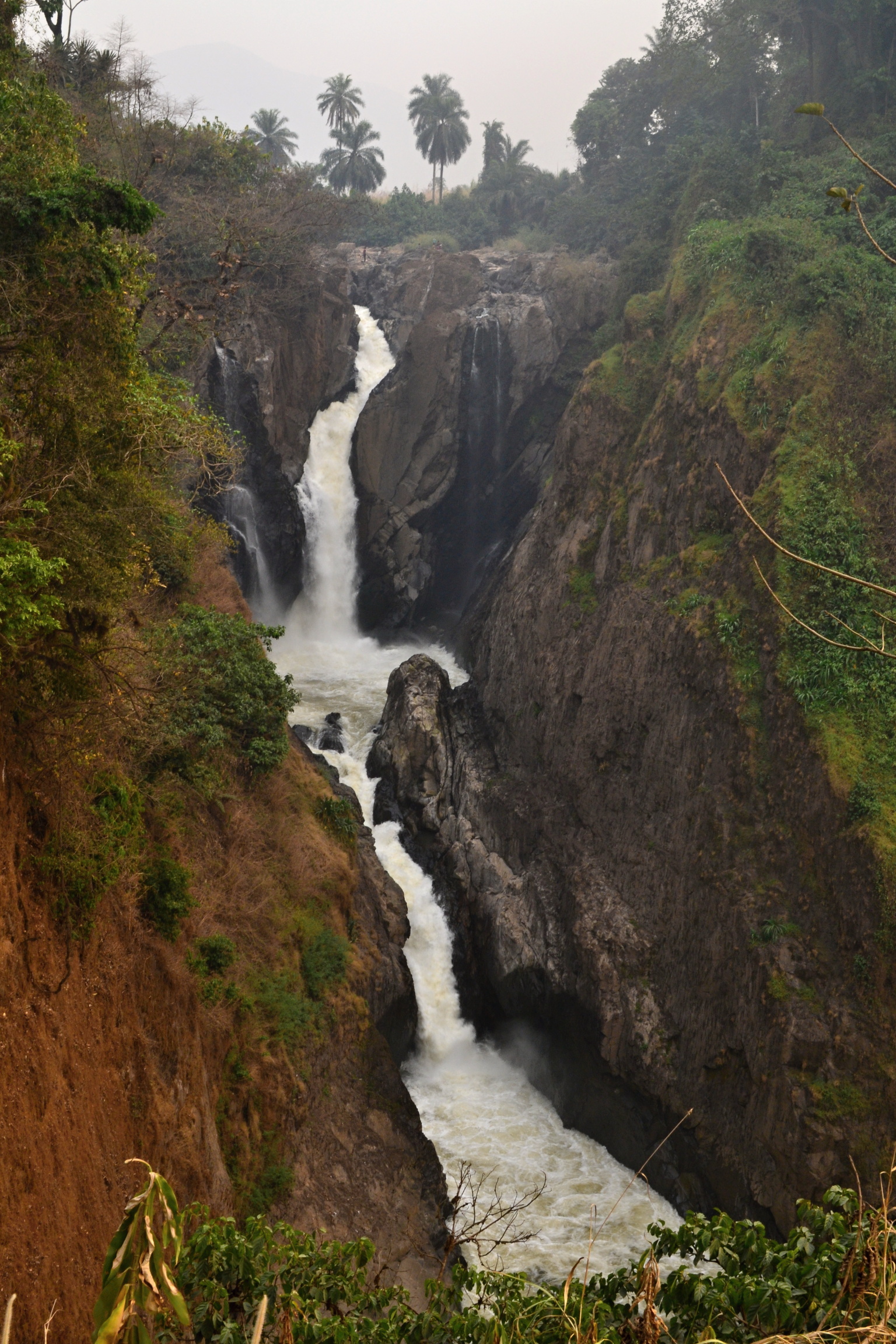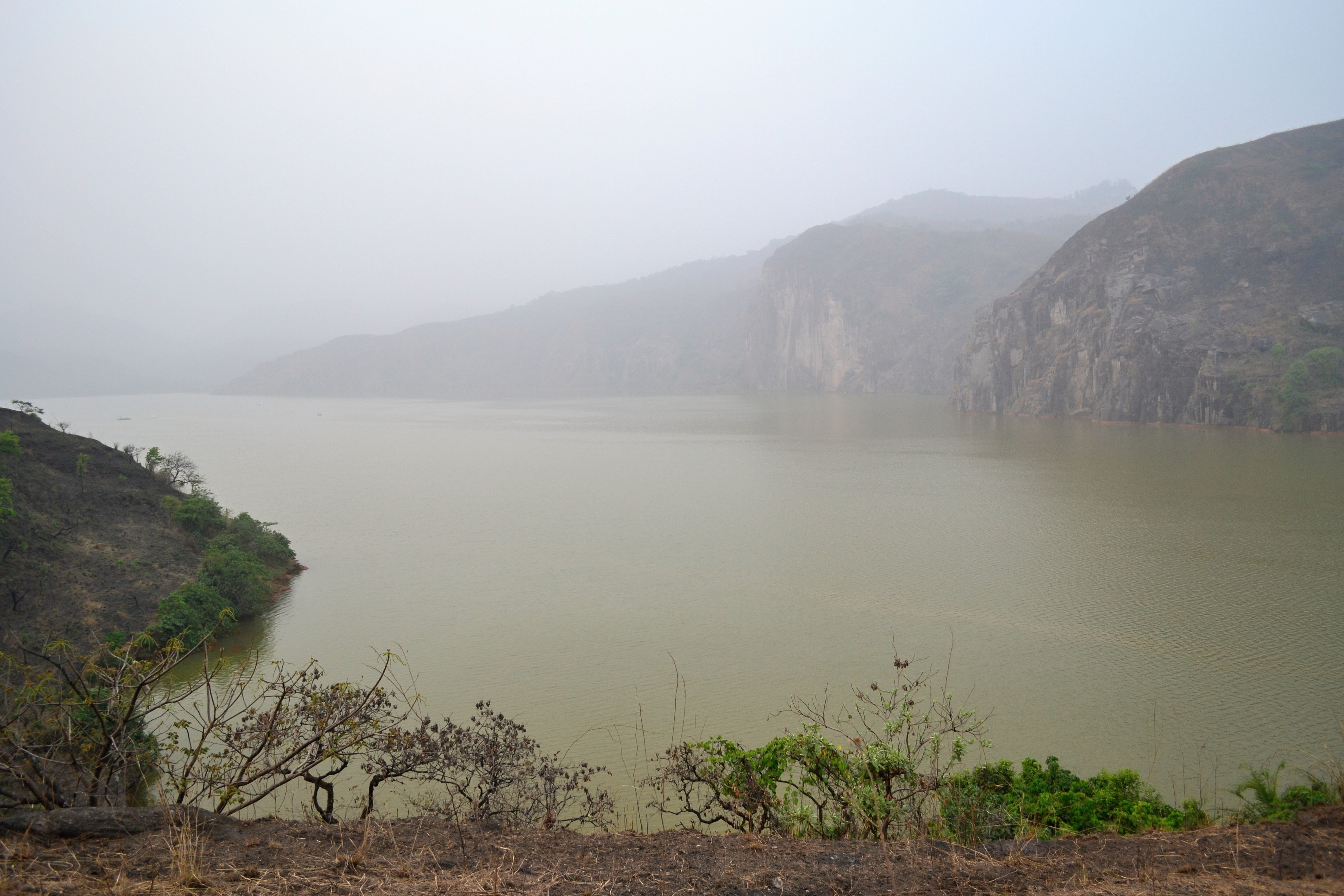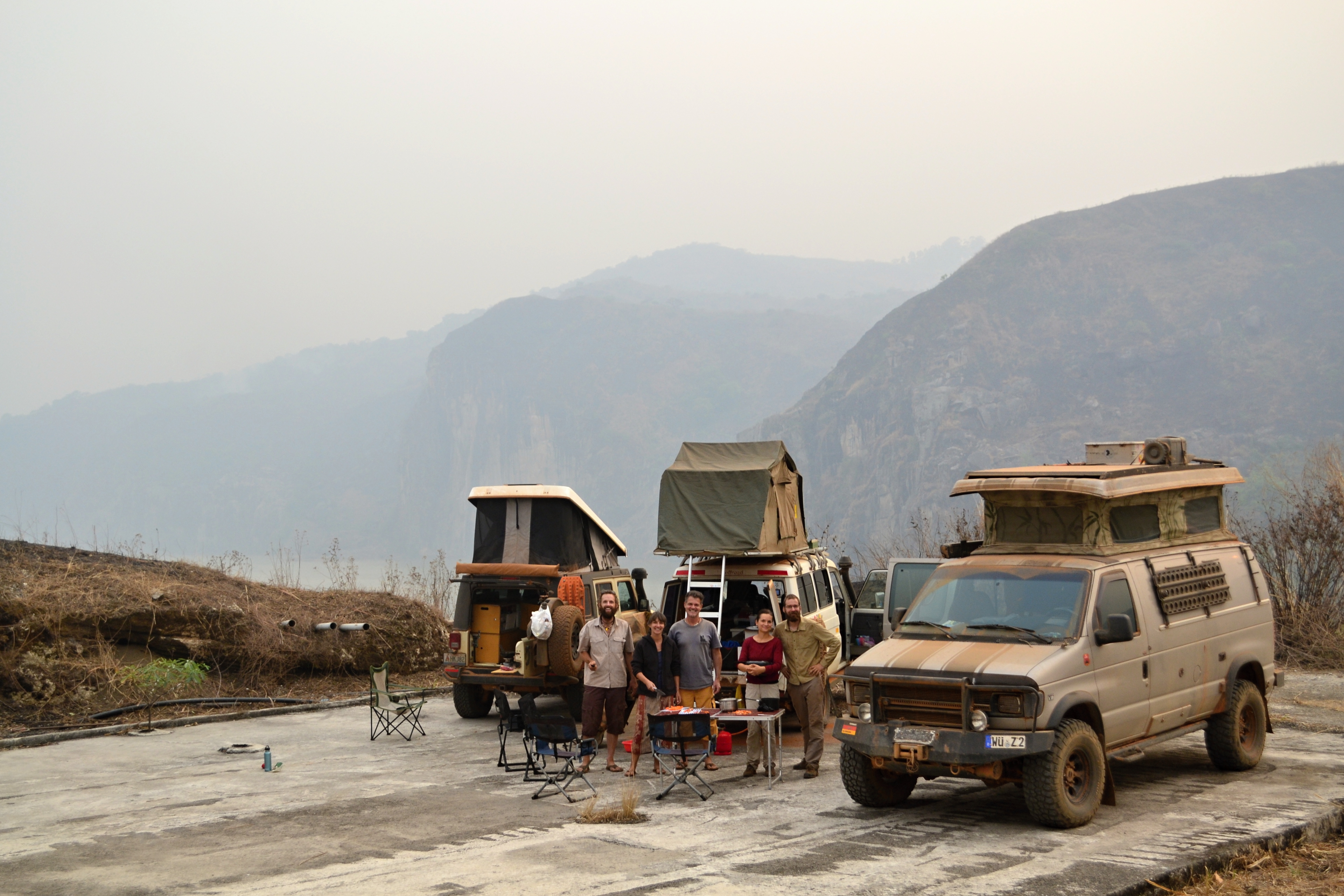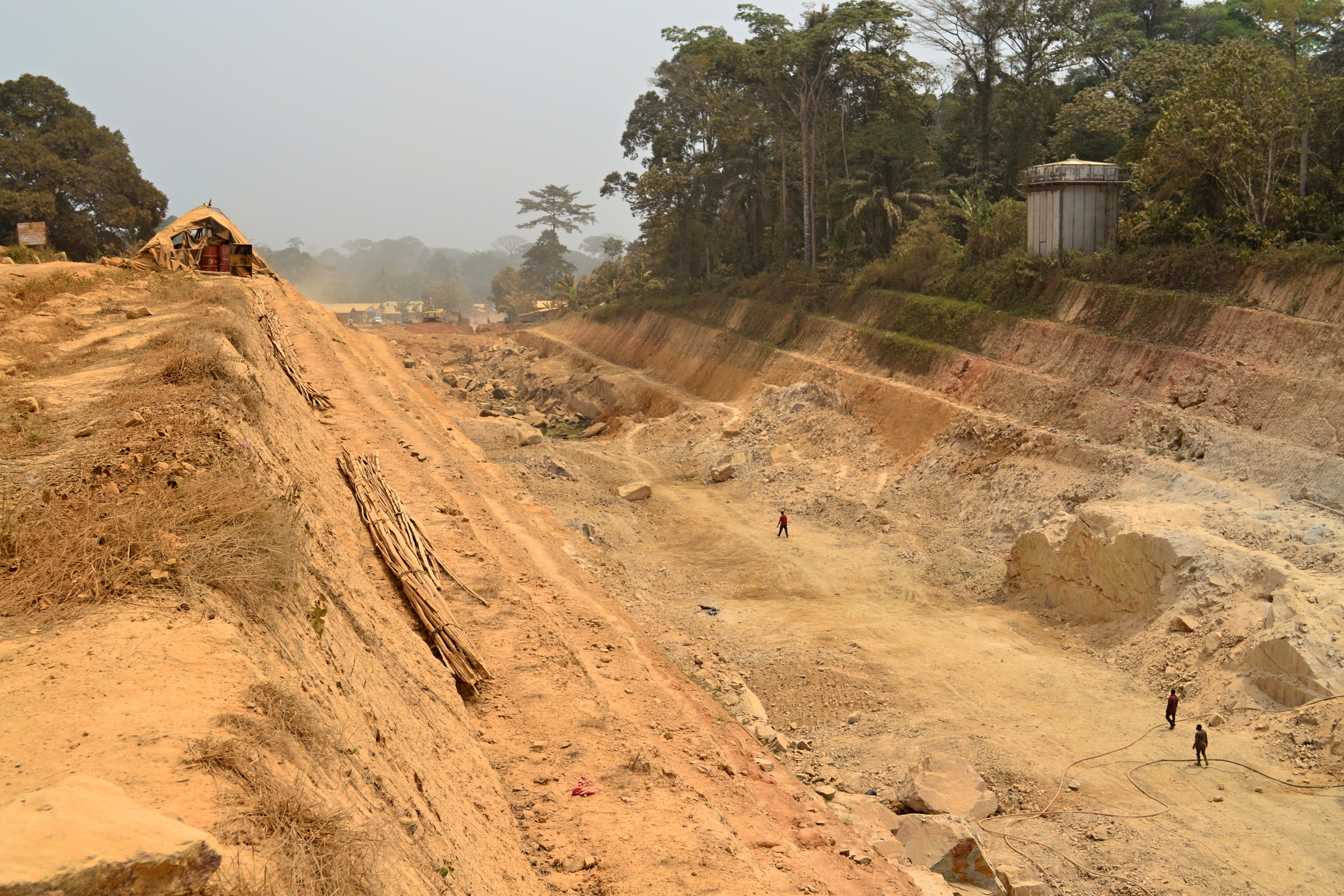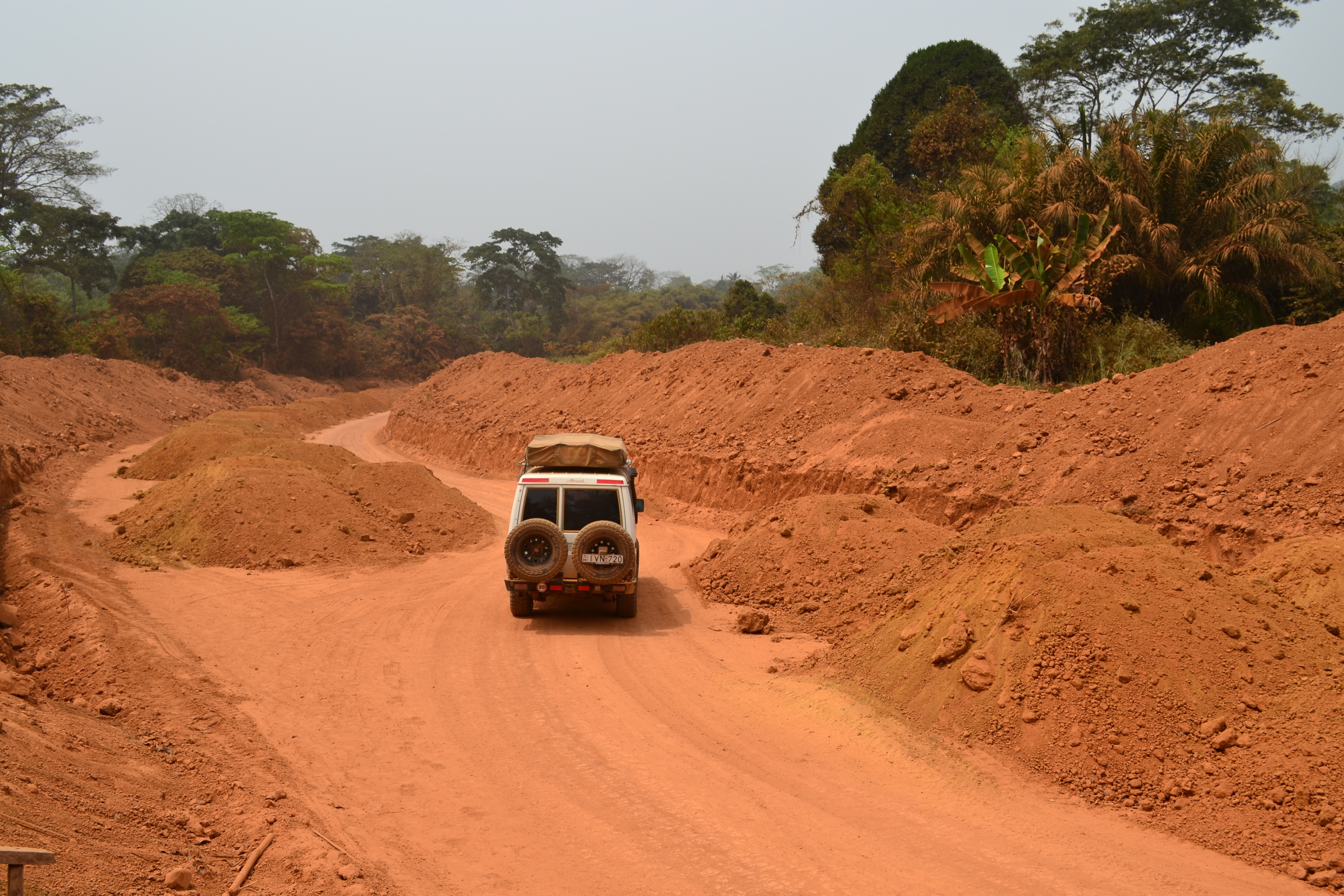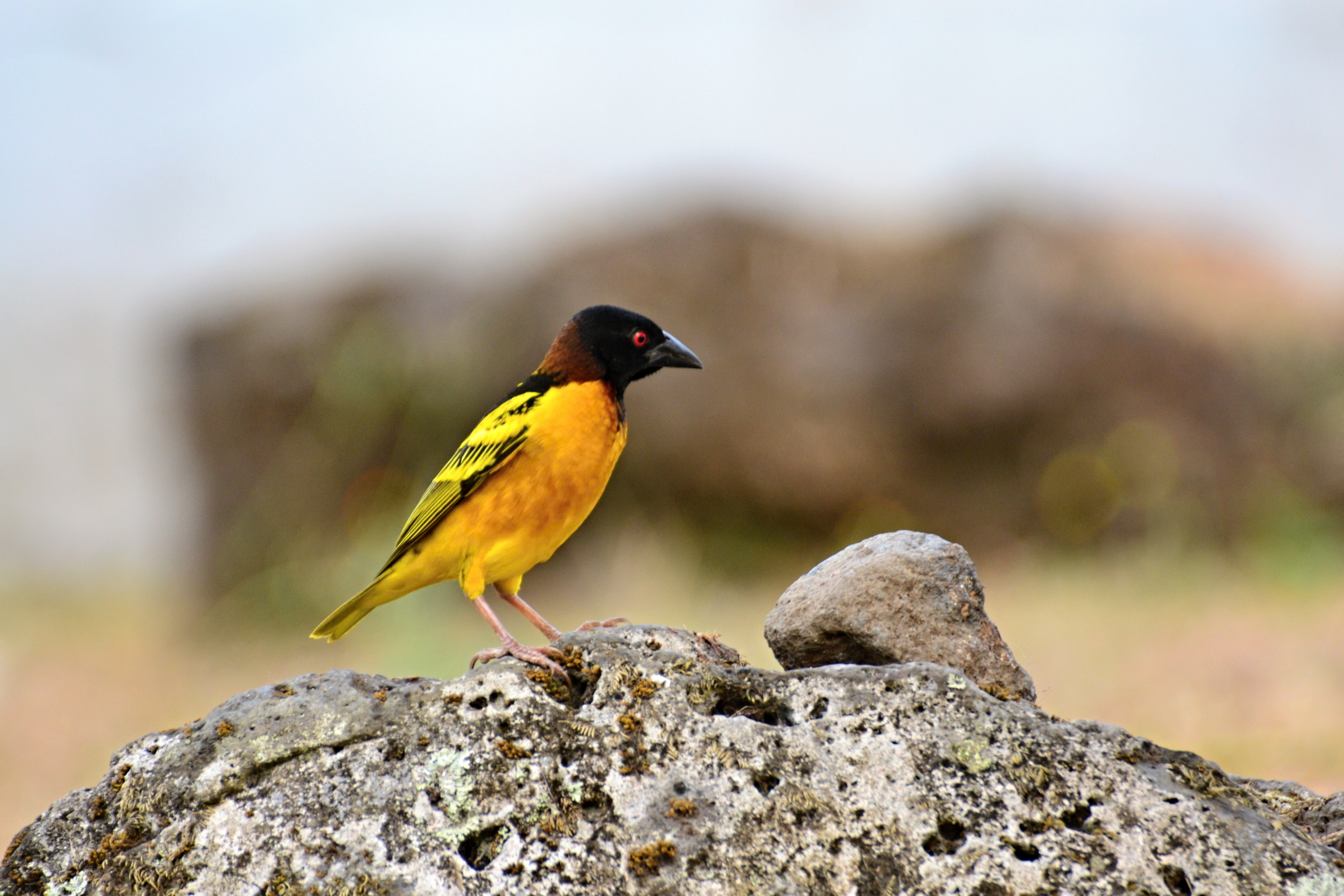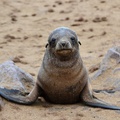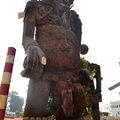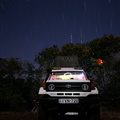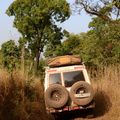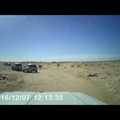1.
Until February 2017 the Argentina-Cameroon match of 1990 was our first and only experience of Cameroon. Next thing we learnt was that they won the Africa Cup a few days before our arrival, so we assumed Cameroonians must be still celebrating when we enter their country. They were not.
The 70 km stretch from the Nigerian border to Mamfe in Cameroon was one of the most infamous roads for African overlanders. In the wet season the mud was often so deep that covering the 70 km could have taken anything from a few days to two weeks. We, however, got over with it in an hour on a wonderful new tarmac made by the Chinese. Something was still bothering us though. For some reason, all the SIM card vendors tried to sell us a tale that there is no mobile net around. Since there was no coverage in our last camping in Nigeria in the last five days, we were hungry for internet. Later this evening, while we were having an excellent street food dinner (grilled macquerel, fermented cassava, fried plaintain, weak beer), squeezed in among locals, we could finally ask reliable sources: what’s going on? Our dinner mates did their best to convince us that they did nothing wrong but the government indeed SHUT DOWN THE INTERNET.
In brief, the two western provinces of Cameroon are Anglophone, while the rest eight are Francophone. The two Anglophone provinces joined Cameroon instead of the English-speaking Nigeria in 1961 based on an agreement that they would still be allowed to self-govern. The tension is now palpable between the two parts of the country. What the most shocking was that the schools in the Anglophone region had been closed for months by the time of our visit – both parents and teachers were on strike. What can force parents to keep their children away from school? For example employing French-speaking military and police, judges and administrators throughout the Anglophone areas; the elimination of the common law regime and no development of the infrastructure at all. The same day at midnight we had an uninvited visitor in our hotel room: a plain-clothed policeman woke us and everybody else in the hotel in order to check our identity and next destination. Next day the manager clarified for us that that day was a national holiday, the Day of the Youth, what the English-speaking region is not willing to celebrate. Hence the reinforced police presence.
The road from Mamfe to Bamenda on the next day was wonderful: lush hills, serpentines, banana trees, and no cars anywhere. The villages were also deserted. In Bali a policeman showed us which way to avoid the protest but we hardly escaped from some slingshots. Tension was in the air in Bamenda: every shop and restaurant closed, empty streets, a well-decorated but empty stage, a few policemen scattered around – nobody else. Although we sympathized with the English-speakers and were very impressed by their strike, we rather did not stay there. Instead, we went to Bafoussam which is located in a French-speaking province: there is internet, food and even sightseeing nearby.
There was no more pleasure cruising: the road between Bamenda and Bafoussam is inexplicably bad, tar with large potholes and bad gravel alternating. We bought the sweetest carrots of our life at the border between the Anglophone and Francophone territories, but otherwise we did not stop to look around and enjoy the celebration of the Day of the Youth: we needed time to find a hotel with wifi, which allows us to park there. A member of the staff was watching us opening the tent and eventually asked: why are you travelling? Anyone thinking we had a ready-made answer is dead wrong. Eventually we answered that this is what we like to do in our free time: seeing people and places. When he replied that he had had no free time, we could not react anymore. Dinner was again on the street: grilled fish with cassava again, this time with grilled corn as dessert. When a girl offered us pistachio-fish paste on our way home, there was no way we would miss such an opportunity. Just like there was no way having a second bite of this extraordinarily bizarre combination of tastes.
2.
In Western Cameroon there is still a number of so-called chefferies or kingdoms, with a king ruling over a few hundred thousand Cameroonians and a few hundred wives Fortunately their palaces are open for visit. The first chefferie we visited was in Foumban. The city instantly fascinated us with the Warcraft-style ogre statue in a roundabout.
We were even more amazed and shocked by an other building in the city center, forming a spider and two snakes around it.
While looking for a restaurant we bumped into Dan, Sam, Didi and Dani, the overlanders we met in Nigeria, at the drill ranch about a week ago and 400 km away. OK, the world is a small village, in particular if you are a tourist. We were so happy to meet other travelers that we decided to join them for the next few days.
The museum of Foumban was wonderful: beautiful masks, bead ornaments (no photos were allowed, sorry) and hilarious stories about Ibrahim Njoya, the most colorful member of the Bamoun dynasty. For example, he first became a Muslim, then converted to Christianity because he did not like the Muslim ban on alcohol, after that he converted to a Muslim again because he did not like the idea of having only one wife. In the end he founded his own religion. Also, he had more than 600 wives.
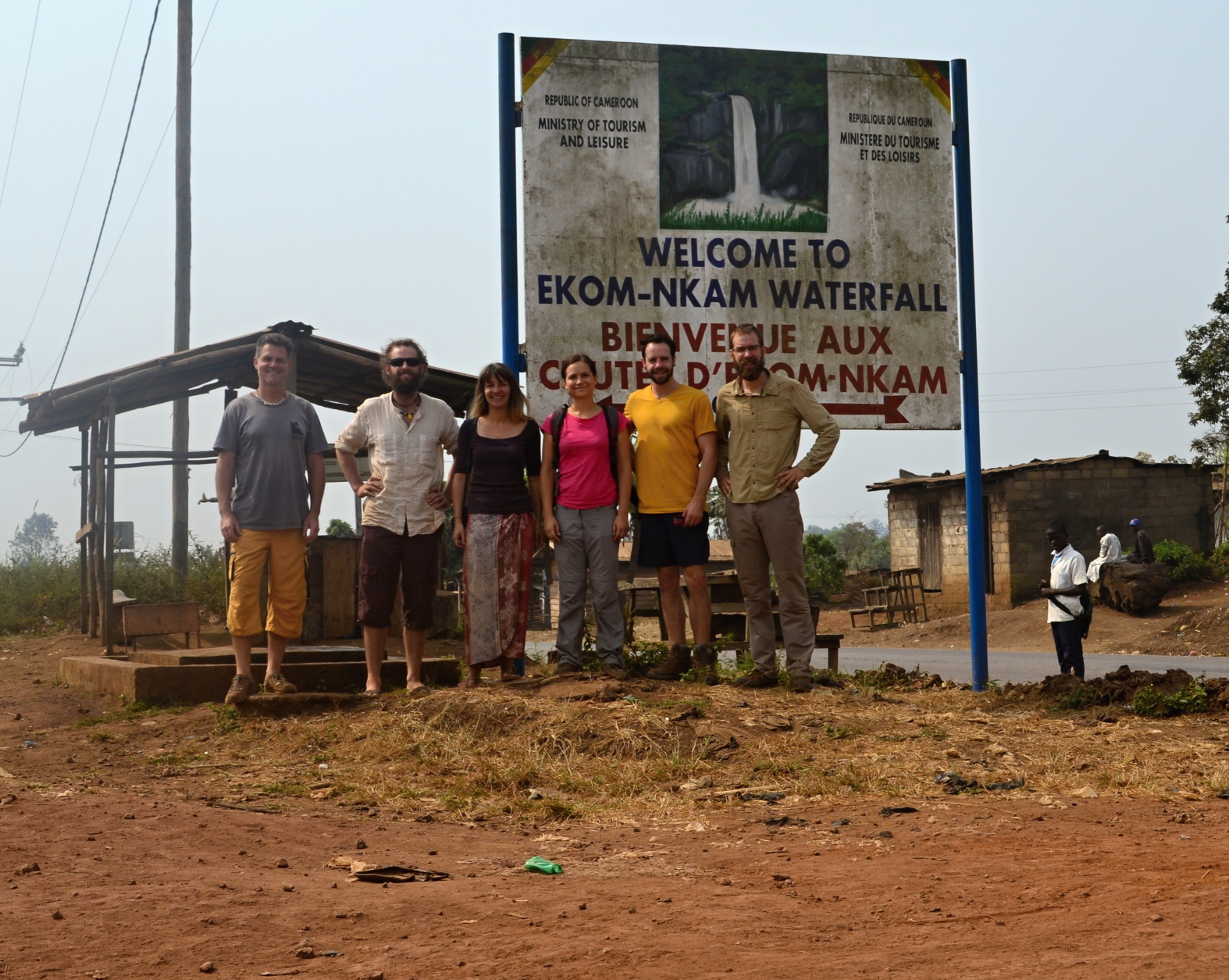
In the next few days we were travelling with Dan and Sam, Dani and Dietmar, in a convoy of three cars. The second chefferie we visited was the one of Bandjoun. Great museum, again: no photos allowed, unless you pay a tip for the guide: Csaba did, he was so fond of a leopard made of beads. We adored these bead animals and the huge masks that they still use for ceremonies attracting a lot of tourists in the season.
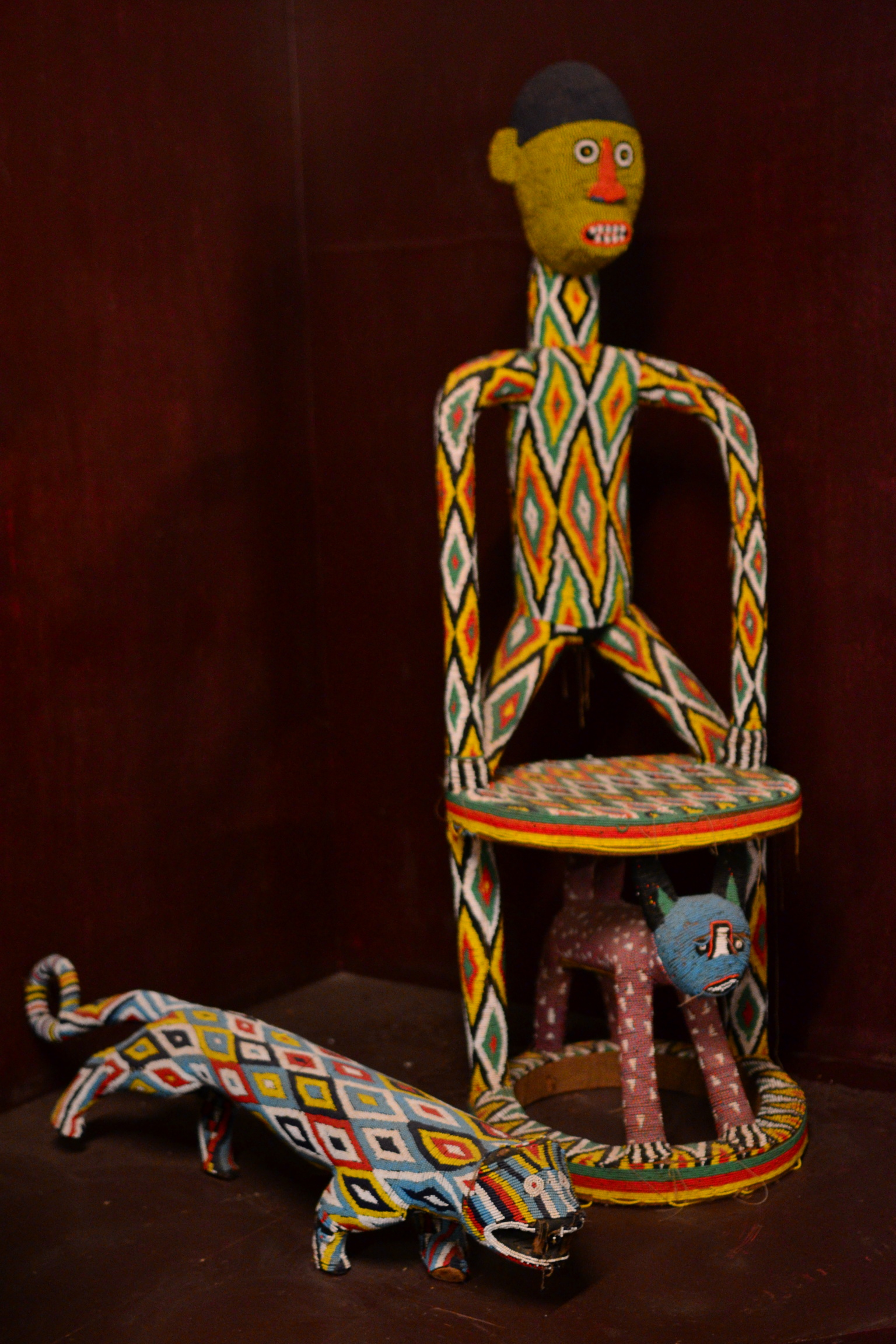
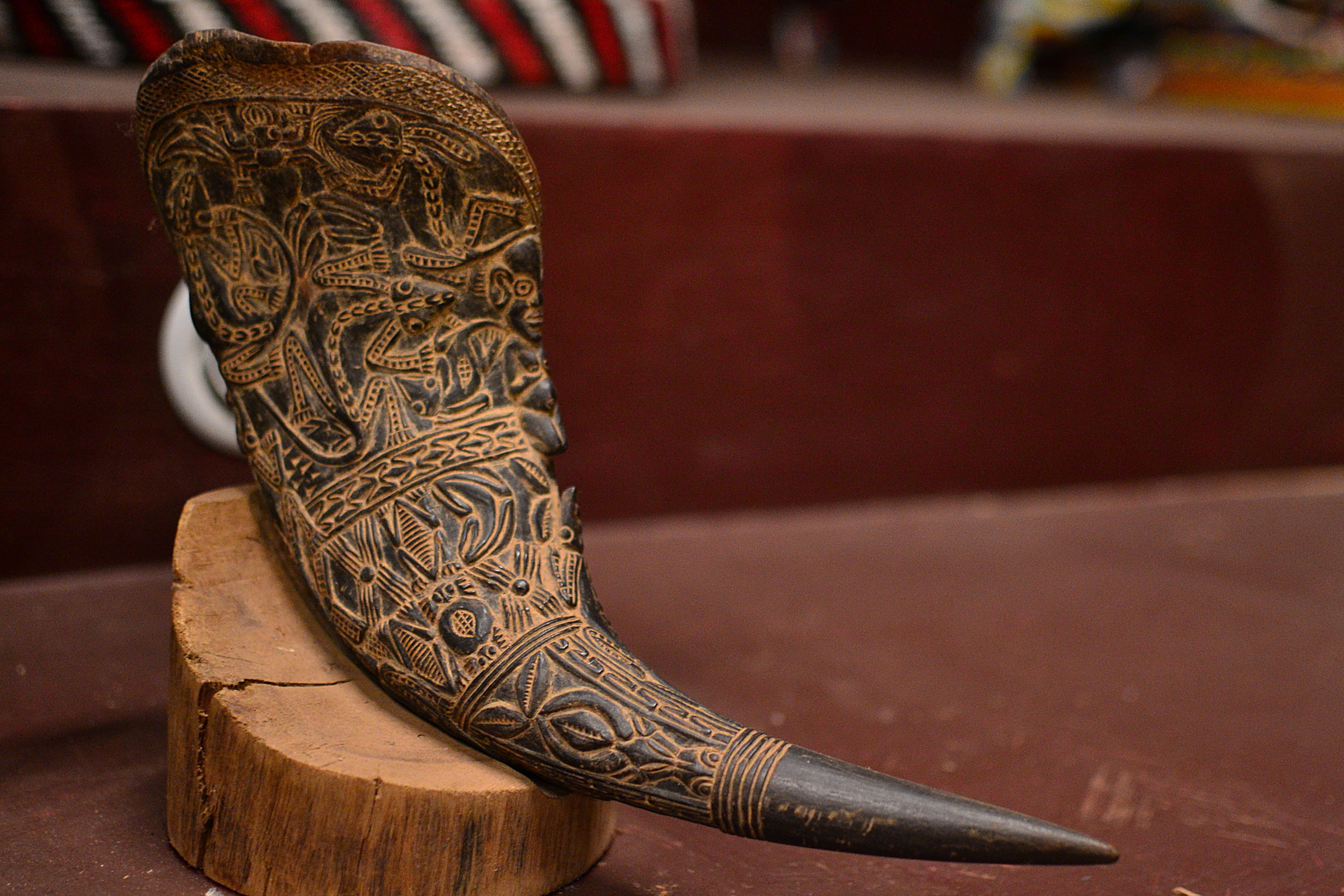
Our next destination was the Ekom waterfall. At the entry we were told that we should register and pay the entry fee, but they could not tell how much it was. So the bargaining started. Since this was the first occasion that we were not alone, the situation was new for us: our travelmates did not want to pay anything and were ready to leave, while we wanted to stay after having driven so much.
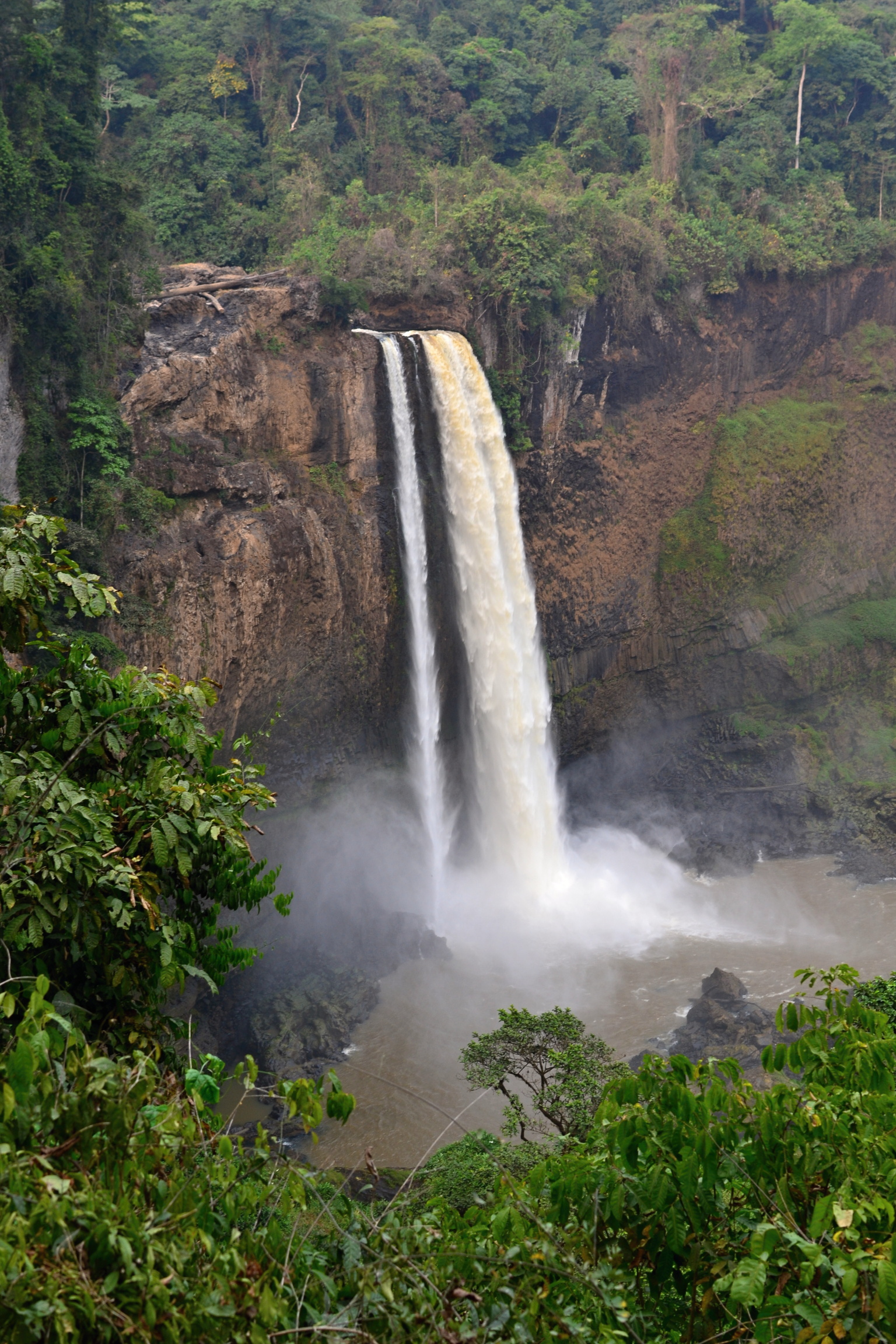
Thanks to his perseverance, Dietmar made a good deal: we paid the entry fee but nothing for the camping. That was a real bargain and we learnt a lot from it. The waterfall was even in the dry season amazing, but the German wheat beer in the bar was maybe even more impressive. We had a great night chatting, exchanging photos while huge moths and bats were circling around us.
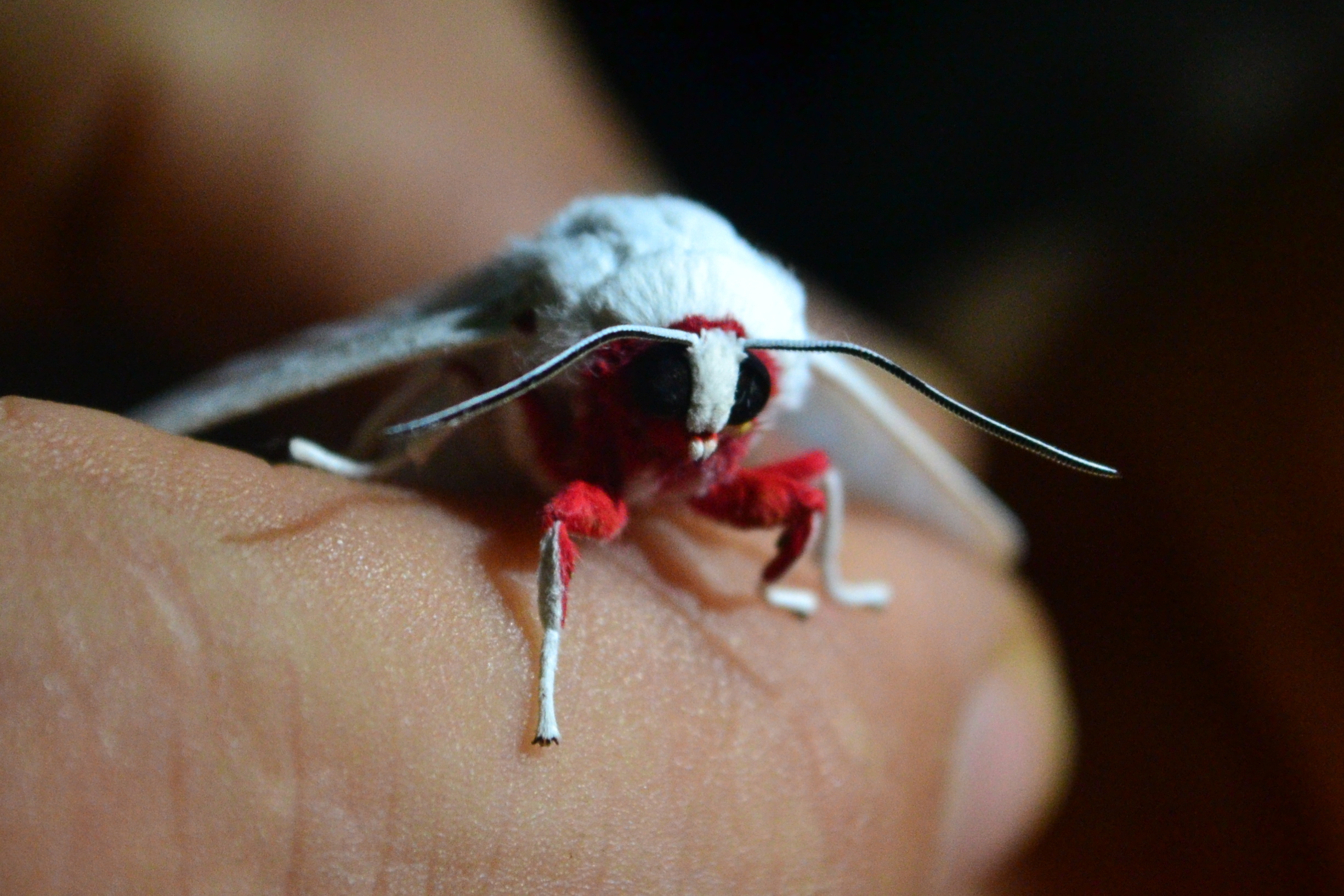
We were looking forward to travel with these guys on the Ring Road, North-West Cameroon beautiful, but very bad-quality road. Our first stop on the Ring Road was Bafut, visiting the next and, for us, the last chefferie-museum. We did not get bored: each chefferie had its very own tradition and special artefacts. Our favorite was the 600 year old chapel which was in striking contrast with the houses around. The German colonial army had destroyed all the other original buildings of the chefferie, then built German-style identical houses, nice and tüchtig. The wives of the king are still living there with their kids. We had to try a real local lunch: achu (sort of mashed potato, no taste), egushi (greenish spicy paste), canda (pork skin, did not try). We were not very impressed.
3.
The ride on the Ring Road was slow, we did our best to make photos despite the harmattan that made everything grey around us. We were passing hills and valleys, rivers, zebus (cow with a hump) and shepherds.
Curiously, shepherds here looked more like Afghanis than Cameroonians. We made some photos of the Menchum waterfall, then arrived at Lake Wum looking for a nice bush camping site.
It did not take five minutes for the military to find us, and in a further minute they were requesting money for our ’protection’. Haha, they did not know that we were mastering the art of not-paying-any-bribe. They had many claims for the money: we are in the military zone (we weren’t), did not register in advance (of course not, since it was not necessary), evil spirits live in the lake (!), we are bringing along a suspicious amount of tools (!!) and so on…it took an hour to reach some sort of result. One of us had to go to the military office and register on behalf of all of us. We designated Dan – he speaks some French but can credibly play dumb. When he and all the military left we settled down on a construction area next to the lake. The night guard was perfectly OK with staying us there and we showed our gratefulness with a sachet of whisky. Good-good, but after an hour we became more and more concerned where is Dan? Dietmar and Dani left to find him and we agreed to follow them if none of them comes back in an hour. We were cooking but our worry grew and grew as time passed and we had get ready to leave the place and jump into the lake/find them. Luckily, about 10-15 minutes before we should have left, we heard Dietmar and Dani coming back, still without Dan but with reassuring news. Dan arrived about 15 minutes after them and shared the full story during dinner and then gin-tonic. Although the military did its best to squeeze money from him and us, Dan managed to register at the gendarmarie and then asked for permission to stay from the chief of the village. After Dan also gave a small (200 ml) plastic bottle of local whisky, the chief did not hesitate long and gave permission to stay, to the clear disappointment of the military. Not much later we learnt that some travellers from an overlander truck had stayed there the day before us and paid without question to the military – that was the reason that they kept us harassing so long.
Our next stop on the Ring Road was Lake Nyos. The 40 km road was very rocky and, with some photo break, it took us 3,5 hours to get there. Despite its dark past the lake seemed very calm.
In August 1998 the evil spirits of the crater lake broke free – hundred thousands tons of carbon-dioxid emerged from the reserves under the lake after a land slide and quickly expanded to the villages around. The CO2 cloud killed 1746 persons in their sleep. Luckily, we did not have to worry: since then the CO2 level is constantly monitored and systematically released.
https://www.wikiwand.com/en/Lake_Nyos_disaster
In the evenings we cooked together (beef stew with Cassava by Dani, tarka daal and naan by Zsuzsi), enjoyed synthetic wine and French cabernet, and shared stories around the fire.
Travelling with this company was one of the highlights of our whole travel. We learnt a lot about cars and how to bargain , how to remain patient. Unfortunately, our Angolan visa was already ticking so we could not linger with them anymore. We still keep contact and hope that maybe we can meet up again somewhere in Africa.
4.
After the Ring Road we were driving to the Mount Cameroon. Our wax there we finally saw the famous-infamous Chinese road construction in action. The road at issue, between Mamfe and Buea has been under construction for several years and each 10-20 km stretch of the 200 km road is in a different working phase – we had smooth tar, gravel and dirt road and had to do some diversions, too. The highlight was when a bulldozer – noticing our arrival – made a ramp just for us to allow further travel.
We arrived by afternoon to the base camp of Mount Cameron in Buea. It’s more than 4000 m but we hardly saw anything from it. It’s a pity because we did not dare to climb it: Csaba was worried for his Achilles, Zsuzsi for her knee. Otherwise, Buea is a quite disappointing rugged little town, so next morning we left early to Douala, Cameroon’s economic capital. The road among tea plantations was beautiful, until the police stopped us and asked for our insurance. We gave him what we had bought for the whole West-Africa back in Senegal (let’s call it a bluff). He meticulously checked and showed us, it is not valid in Cameroon. Hoops. We were getting frustrated especially when he found a local insurance and showed it to us. In the next moment he was already laughing and became our best friend. Csaba gave him his Hungarian phone number so we can host when he comes to Hungary (if ever).
Morning as usual, shopping, we also bought real car insurance for Cameroon. It was past 3 when we realized we better go to Yaoundé so we can service the car before the weekend. Hm, it’s quite late, 240 km ahead, it’s going to be dark. We could not rush, though, the traffic was crazy, and we even had to deal with plain-clothed traffic control officers. They asked for everything: insurance (HAHA, we just bought one), all the papers, we showed them our triangle, vest, fire extinguisher. Then they demanded that we show our two cal metalliques. What? It took some time to understand what they were talking about – a red-white striped metal sticker on the front and back of the car. They claimed that it is mandatory for each and every car in Cameroon we all saw that maybe every second car had them. Oh, of course, we were stopped just right next to a vendor! Csaba was explaining them the usual (we are tourists blahblah) until he lost his patience and politely shouted at them that they either call the police or let us go. This worked and we were let go. Funny, we worried about the Nigerian officials, but had much more issues with the Cameroonian ones.
TCH-TCHKK! That’s how two stones cracked our wind shield. Oh shit. There was no one to blame, no way to be prepared for that. The crack looked quite nasty, one more thing to do in Yaounde. Then the night fell, Csaba saw hardly anything so he started tailgating a bus, so he did not have to worry about people on the road or unnoticeable potholes.
We had a great time in Yaoundé as Rikard, Csaba’s former colleague hosted us, and he was a wonderful host. When we noticed his washing machine, we became ecstatic and washed everything....
The next two days we spent in the service, but on one of the evenings our host took us along to his Cameroonian dance class. Csaba still has PTSD. Zsuzsi found it familiar from the old days of aerobic classes but doing that ass-shaking and head-dance was totally out of question. No pictures, not that we would share them.
Our last experience from Yaoundé is a traffic accident where we were the victim. We were standing in the traffic jam when a taxi driver got distracted by the Saturday morning market and bumped into us. Our first accident in Africa! We imagined it would be worse. Luckily, we were the bigger one so the taxi made no harm in the car. Our next destination after Yaoundé had the funniest name of all the Cameroonian places, Lolodorf.
5.
We went to Lolodorf because according to our research that’s where Pygmies live who do not make their living by entertaining tourists. We read that Pygmies are one of the last tribes which not only still keeps their ancestral way of living, but who are also very friendly. In Lolodorf a bar owner gave us instructions which direction and road to take because Pygmies live in the deep forest, in their own campements, far from the main roads.
Naturally, we had to stop about three more times in 5 km and ask for direction, until we found the narrow path winding toward the Pygmy settlements. We were in real jungle and the road itself was a reason for excitement – clearly not often frequented by cars. We stopped at the first house and explained that we are looking for Bakas – we learnt that we should avoid the ’Pygmy’ word, not PC. The lady answered that OK, we had found a Pygmy (!), here she is. Also, what kind of gift do we have for her? Hm, not a nice start, not very hospitable. We went further in the forest and found a village, an obviously Pygmy village. A couple dozen children and about twenty adult came to see us. We knew in advance that we have to give gifts so we gave what we had: two small sachets of whisky for the chief and candy, toy for the children. The people around us seemed confused, at best. A man finally said it out loud: our gift is not enough and he was also agitating against us. We waited a few minutes then practically escaped as we did not feel welcome. We honestly believed before our arrival that our gift would be appropriate. We felt bad that we had to explain ourselves we did not mean to insult them or their traditions. We felt bad that we apparently did so still.
No picture was made, but yes, Pygmies are small. The village was clearly very poor. While leaving Csaba asked a lady who was fluent in French what would have been the appropriate gift. She explained that Whites usually bring rice, fish, soap, wine, sufficient for the whole village.
The incident was eating us for a while. What Whites? This place was not in the guide books and we never read that we should travel around with bags of rice. Maybe tourist agencies bring here visitors? We read that earlier there were conflicts between locals and the oil business – maybe the conflict was resolved by these generous gifts? Surely we were aware that the village is not a tourist attraction. We might have been complacent: the last three months we had spent in Africa taught us how to behave, what to expect. We expected that our small/symbolic gifts would be appreciated (as it usually happened), and that we will meet overly friendly people anyway (as it usually happened). To be clear, we do not think the village was one of those horrible African places where tourists/whites are regarded Dumb ATMs. Our conclusion rather was that we and them had totally different experiences and expectations.
Anyway, we learnt our lesson and in Namibia we hired a guide who helped us with the shopping, thus we visited Himba and Herero villages with a decent amount of gift.
The day after our visit in the Baka village we left Cameroon.

